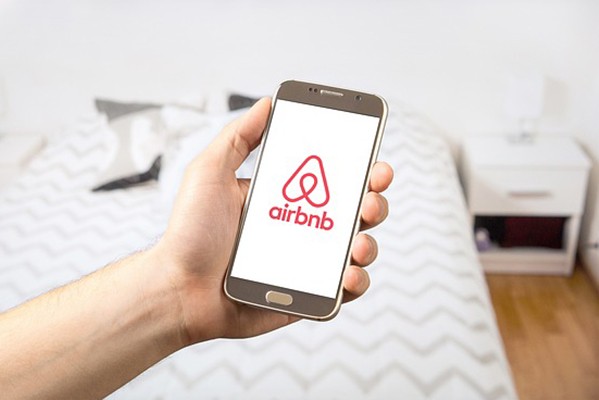Listen to the podcast here:
Increase the value of your multifamily property by converting units to short term rentals. Michael Sjogren, the CEO of Occupied LLC, recounts how he started his business and how he got that lightbulb moment with short term rentals. Such rental scheme might not be everyone’s cup of tea, but with Michael’s ideas, you would want to have your unit be a part of it. In this episode, he shares how he conceptualized the entire platform and how he can help you switch your portfolio to short term apartment rentals. He also reveals some of the tools he uses in automating his syndication business. You can learn more about this unique rental scheme and how Michael is building his business and going after bigger opportunities.
Our Gracious Sponsor:
Are you wanting to learn how to gain financial freedom through having your own syndication business? Text LEARN to 474747 to begin to learn from one of the best in the industry, Vinney Chopra. Vinney came to the US with only $7 in his pocket, and now controls hundreds of millions of dollars of real estate he has acquired through multifamily syndication. He is now personally coaching others to do the same. Text LEARN to 474747 to begin your journey to starting your own syndication business! Vinneychopra.com
—
Watch the episode here:
Increase Your NOI by Converting Units to Short Term Rentals with Michael Sjogren
Our guest is Michael Sjogren. Thanks for being on the show, Michael.
Thanks for having me. I’m excited to be here.
I’m glad to have you. Michael is the Founder and CEO of Occupied, a technology-driven short-term rental company that specializes in hosting families, business travelers and leisure guests throughout New England in short-term rental stays. He’s an investor, entrepreneur, CPA, author, speaker, instructor and iTunes podcast host. He started his career as an auditor at an accounting firm where he specializes in real estate and economic development. He worked in finance for an international energy company with annual revenues of $15.2 billion, advising the senior leadership team on high-value complex transactions. Michael, thank you so much for your time. I’d like for you to give the audience a little update, what your focus is now and we’re going to dive in the specific niche that you’re in.
When you’re reading that out, I’m like, “How did I end up in short-term rentals?” I majored in Accounting like you might be able to tell from a lot of my background work. I got into the corporate world. Like many people I was told, “Go to school, get good grades, get a good job, put 10% in a 401(k) and someday you’re going to retire wealthy.” I remember I was somewhere around 29 to 30 years old and my wife and I had our only a son. He had some health challenges and I remember being at a hospital with him for about three weeks with my wife at a time. I remember all of a sudden, I had this horrible feeling come over me as I started thinking, “I’ve been here for three weeks and I’ve used up all my vacation time. I’ve used up all my sick time and my paychecks are about to stop coming in. It was the worst feeling as a father and a husband to have to leave my family during that time to go back to trade my time for money for a paycheck.
At that moment, I vowed that I would find a way to create income without trading my time for money. After that point, I started reading everything I could on real estate investing and passive income, everything that I could find under the sun. I joined a mastermind group and I came across as this little niche strategy of short-term rentals. Somebody was telling me that he was able to generate profit anywhere from $1,000 to $2,000 a month per property with short-term rentals like that’s positive cashflow after everything. I was like, “There’s no way. You’ve got to show me the numbers here.” Long story short, he showed me the numbers. I was like, “I’m in. I’m sold.” A few months later, after our son got better and grew out of that whole situation, and as a way to celebrate and as a way to kick off this new lifestyle, we decided to purchase a ski house up in the mountains in New Hampshire. We bought this property, we renovated it, we furnished it and we started renting it out.
We would do anywhere from $1,000 to $1,500 a month consistently in positive cashflow after all expenses, mortgage and everything. We were using it every single month for at least four or five days. It was a vacation house that was paying us that money. I was like, “I’m sold. This is the coolest business ever.” I get paid on vacation homes and I was off and running. The challenge was that I had taken all of my liquid cash to buy this one property and I was out of money. I’m like, “I need to scale this. I can’t live off of $1,500 a month.” Rather than going the traditional route of raising private capital, I said, “What if I could find landlords and partner with them and create a short-term rental management company and go about it that way?”
I was doing some research and seeing that traditional property manager for small single-family, probably up to ten-units, they might charge 10% of the revenue. For short-term rentals, you can charge anywhere from 15% to 30% and the revenue is four to five times higher. I started talking to landlords. I started a meetup, educating people about this amazing new opportunity around short-term rentals and started getting clients one by one. I started expanding outside of New Hampshire and outside around Boston. I got one in Florida. Now, we’re looking to syndicate after all of that management company stuff. We’re looking to bring in some investors. We’re working on a large 150-plus unit resort community up in New England. It’s been a fun ride. It’s been cool and it’s been an amazing journey. It’s been the most fun I’ve had with work and investing ever.
You started to find landlords that you could help change their business model to increase their income.
I found landlords that were looking to rent their property on Craigslist or Zillow or anywhere like that. I’m like, “I see you’ve got this property for rent. Let me show you some data on this new model that I’m working on, that I’ve got some data on. What if I could increase your revenue by two to four X?” They were like, “What’s the catch?” I’m like, “There’s no catch. It’s just a different model. We’re renting your property out by night instead of by the year.” A lot of people said no. A lot of people were scared and everything else. The first couple that said yes, we get some data after a few months and like I told them, they were two to four X in their top-line revenue on these properties. It’s been fun.
Where can I do this? Are there specific locations? Is it wide open? Is it any city? Where can we do short-term rentals?

As this niche matures over the next couple of years, some of you may have seen there are different regulations. Every city is different. I avoid any major cities. I live just outside of Boston. I don’t operate within Boston. I operate about 30 to 45 minutes outside of Boston. Any large, major metro or major city that has a “lack” of affordable housing, they don’t like short-term rentals because they’re like, “We need inventory for people to live here.” As far as would it work in a market versus Google short-term rental ordinance and enter your city name and then that will tell you if it’s legal or not. The most common restrictions I see are owner-occupied or the limited number of days in certain major cities, but other than that, it’s pretty new. When a lot of people think of short-term rentals, they think of vacations.
One of the things that I talk about a lot is there are nine different traveler profiles. I won’t go through all of them but if you think of it, you’ve got vacationers and you’ve got corporate travelers. If you’re anywhere near a university, you’ve got traveling staff, you’ve got people visiting, you’ve got parents visiting. If it’s like vocational schools or nursing school, it might be a thirteen-week program. They need to come to somewhere for a shorter period of time, a few months. If you’re near a hospital like the situation I was talking about earlier, we were there for three weeks at a time. That’s very common, especially at some larger or specialized medical facilities. Those are a few and in general, there are lifestyle events. No matter where you live, people move away and then they come back for birthdays, weddings, funerals, wakes and all sorts of life events.
As far as multifamily properties, complexes, is that something we could incorporate? We closed on a 180-unit property. Is that something I could consider like, “I’m going to take two units to start with and convert them to short-term rentals?”
Absolutely. A friend of mine from my mastermind group operates down in Southern Texas. He owns a lot of apartment complexes and he’s starting to transition about 10% of his units to short-term rentals where he will furnish them and he’s generating fantastic cashflow. I had a call from an operator up in Canada who’s doing the same thing. She’s starting to switch her portfolio. She’s starting to allocate some of her units to short-term rentals.
I will say that deal specifically. We have professional management that’s managing the day-to-day operations. How would that work? These two units, you’re not managing, other than maybe maintenance and some direct things like that, but then I’m going to hire somebody like yourself to say, “Michael, you’re managing these two units.”
You could go that route or I teach my students, the portfolio that I have now, I have all the systems in place. I can manage that portfolio in less than two hours a week because so much of it can be automated through all the amazing technology that we have. A lot of people, myself included, when I first looked at this business I’m like, “It looks like great cashflow, but it’s got to be way more work than hiring a management company like traditional large multifamily investing.” The truth is if you have the right systems in place, you can automate 95% of the business. If you wanted to, you could do it yourself or you could hire somebody like me, but this is all we do.
Can you give some examples of how you’re automating? Maybe some tools that you’ve found to be very useful that we could use on our syndication business as well.
There are four systems that you need. We can talk about a couple of them, but the first one is pricing. Similar to hotels, airlines or anything, if you go online, you will notice those prices change every single day. There’s a bunch of them out there, but I use a software called PriceLabs. That automatically adjust my rates every single day to maximize my occupancy and my revenue throughout all my properties. I will go in and review it once a week on Monday mornings and see how I’m doing in certain things and maybe tweak things here and there, but that handles the majority of it. You need communication or a channel manager. If I put properties on Airbnb, HomeAway, Booking.com, Expedia, all of those, you need to make sure that those calendars sync up and that all the messages on all the platforms come together. You want to automate most of those messages because I get thousands of messages a month. I don’t want to sit behind my phone or my computer and answer all those messages. There are different software that you can use to manage that. A lot of them even have artificial intelligence. If somebody is like, “Where’s the pool?” It will detect the question about the pool and it will send a response about the pool.

Something simple about how to get in, a code or address. It can know exactly what to say.
The third one is around access and security. We will talk about this one because this is a common concern for most investors. Access, there’s a bunch of different Wi-Fi locks that you can use. Nobody ever gets a key to one of my properties unless it’s an emergency and they have to use one of the lockboxes. I use a Wi-Fi lock system called August Home. That platform integrates directly with Airbnb, HomeAway, and a bunch of other platforms. Anytime somebody books my properties, it automatically sends them an email that says, “Here’s your unique code and here’s how you can download the app to access the property.” That code is only valid during their stay from 4:00 PM on check-in date to 11:00 AM on checkout date. That code no longer works after that.
From a security standpoint, nobody could go off and make duplicate keys or anything. I have a four-step system. You’ve got the Wi-Fi locks. I use as a Ring security camera on the outside of every property. Their government ID, profile photo and everything has to match on August Home, which has to match on the Ring security camera. If somebody says, “I’m coming with my wife and two kids,” and then they show up and I see that there are fourteen people there, I know that there’s an issue. I can send somebody from my team or call the police and get them out of there. Inside the property, probably the coolest piece of technology and I was hanging out with one of the cofounders is called NoiseAware. It’s about the size of a mouse and you can plug it into an outlet in the property and it measures noise levels.
You can’t hear conversations or anything, but all it does is measure decibels. I can program that thing to say from between 10:00 PM and 8:00 AM, which are my standard quiet hours. If it goes over this baseline threshold, it will text me immediately. The first time before I had all this cool stuff, somebody did trash my place, then I upgraded and added those stuff. It’s happened three times and I either send a message or I call the guest and I say, “I hope you’re having a great time. I don’t want to be the party pooper but I did get a noise complaint from one of our neighbors. I don’t want to be the bad guy, but we got to keep it down. As you agreed with our house rules, our quiet hours are 10:00 PM to 8:00 AM.” Every time they’re like, “I’m so sorry. I didn’t realize how loud we were being. We will tone it down.” That was the end of it.
[bctt tweet=”A lot of people think of short term rentals as vacations.” username=””]
The Ring security camera, I’ve seen those and that’s interesting. Are you the one looking at the people when they do that?
I used to look every single time. Now, I will only check it if I think something is off or there is some issue that comes up.
Is it recording?
Yes, there are different subscriptions. I pay for the subscription that they keep it for 30 days. It’s all motion detector. You can set it to record constantly or I have it on motion so I’m not burning through batteries all the time. When there’s motion, it records for a minute. It’s nice as a form of record. If you go back to the guest and say, “There were ten people there. I’m going to charge you extra for those extra people.” If they say, “No, there wasn’t.” I can say, “There was. I have the video footage here,” and submit that.

What about safety for other tenants? If I have a multifamily property and I’m going to do this with a couple of units to test it out. What about safety for the person that’s her home right next door?
The only way that somebody can book my place instantly without me approving them is if they have a completed profile, which means they have a verified name, email address, phone number, government-issued ID and they’ve already had a positive review from another host. They’ve already used the platform and somebody else like me already hosted them and said, “This was a good guest. They were great. They took care of the property.” That’s the only way that you can book my place without me physically approving you. Otherwise, you have to send my team a message and say, “I’m coming to the area for X, Y, Z. There are going to be X number of guests. It’s my wife and my two kids, my brother-in-law, a couple of buddies,” or whatever and lay that all out. They have to have everything completed, then I could check the security cameras. If I felt anything was off but I don’t rent to people under 25, I have those baseline rules in there.
As they’re looking through Airbnb or whatever, does it know their age? Is it not going to show your place if you’re not open to that if they’re under 25?
VRBO has done a better job with that. For Airbnb, I’ve got to do a little bit more digging in looking people up. I came back from Puerto Rico from a mastermind event for short-term rental operators. A gentleman was working on new software that he’s rolling out that will automatically run background checks and screen every single guest. It’s like a service and it links up with all the profiles. He’s going to be launching that pretty soon, which will be cool. It’s called, Auto Host.
[bctt tweet=”If you have the right systems in place, you can automate 95% of the business.” username=””]
What’s the best platform if we’re traveling? Do we need Airbnb or VRBO?
I love Airbnb. The platform is super easy to use. What I find is VRBO does better for large resorts. If you’re going for a huge villa as we stayed at in Puerto Rico, VRBO is going to have more of that style. Airbnb though, I find it super easy to use. 98% of my bookings come through Airbnb. There are so many people on that platform. I think 1.4 million new people are joining every single week. It’s massive.
I want to hear as much as you can share about how you’re moving forward and growing your business and incorporating syndication in this short-term rental as well.
I’ve started picking up management clients, onesies, twosies, two families, three families here and there. As multifamily, if I want to ramp up and scale faster, I’m going to raise money and I’m going to go for larger properties. We’re finalizing an LOI with an owner. I can’t talk too many details because we don’t have it technically under contract yet, but it’s over 150 units. It’s a resort of condos. If you purchase one of these condos, you can put it in the management pool. It’s a vacation community. You can use it whenever you want. If you want us to manage it, we can manage it for you for a fee. You’re looking at over $10 million for that deal with about $4 million raise. I don’t have that capital myself so we’re going the traditional syndication route with that deal. We will raise about $4 million. We will do $2 million in capital improvements. Ideally, I want to finance those in. It would be about $12 million purchase price, raise about 30% and then factor in another few hundred thousand in closing costs and surveys and everything else. It’s about $4 million raised for that project. We’re anticipating being able to double the NOI on that property based on the technology that we’re using. That’s cutting drastically down their overhead and expenses as they are and then getting them on more of these online platforms like Airbnb, HomeAway and everything else.

A lot of the same things we would look for in a value-add property, mismanagement or something. You’re going to be looking for those same things, but now you can bring this other model into this complex that we would be looking for. Maybe we’re expecting a specific kind of income or NOI, but because you have this model, you will be able to increase that a lot more. I would imagine it’s more management heavy. A lot of it is automated but it’s daily.
The difference is I would have a staff of cleaners, whether I contracted them or bring them on as FTEs into the management company. Then linens, I would either hire a linen service like a hotel does. They grab all the dirty sheets and towels and then they send it off to some company that cleans them and brings them back or I keep it in-house. They have an off-site laundry facility that they own. They do all the laundry in-house. All the other stuff, you’ve got your handyman running around doing what they got to do. They have a leasing office, but I don’t think I need that with this model because I can allow people to self-check-in. I may keep that to have a face upfront and welcome people. You don’t technically need it with this model. We will see how that goes.
We’ve mentioned a lot of pros, but what’s the con for short-term rentals?
The con is if they come in and all of a sudden ban short-term rentals, that’s highly unlikely in this particular market, which is why I’m very comfortable doing it here because it’s such a friendly town toward short-term rentals. What I tell people and a lot of my management clients when they’re like, “Where should I get the next one?” I’m like, “You could get it here, here and here but always remember, it’s easy to cashflow with short-term rentals but before you buy it, make sure it will still cashflow as a twelve-month lease. If you had to rent it out long-term, make sure it will still cashflow.” That’s the advice I give all of my investors when they’re buying these properties. If it doesn’t cashflow as a long-term rental, don’t buy the deal. This is just the gravy on top is the way I look at it. That property in New Hampshire, I’m getting 30% cash-on-cash return and I’m using it every single month. I know if something crazy happened and they changed anything, I could still rent it out and make a couple of hundreds a month on that, no problem.
[bctt tweet=”Hiring virtual assistants greatly helps from a scalability standpoint.” username=””]
You can’t control if they changed the regulations on you. That happened locally where I’m living. A lot of people were doing short-term and then all of a sudden, they cut it off.
It’s more applicable to us as larger-scale investors. If you wanted to go in and scoop up a whole building and try and do it, it’s a little different than if you wanted to buy a vacation house and rent it out as a second home. That’s a lot different. What they’re doing in a lot of major metros is they don’t want us gobbling up all the inventory in a big city that has a shortage of housing. Other than that, they’re trying to figure out what to do. A lot of it will be putting us on par with the hotels where they have a permitting process and annual inspections. It is more around safety and collecting taxes. It’s not going anywhere. It’s like cats out of the bag. Everybody’s gotten a taste of it and it’s not going to go away because everybody loves it. Now, they’re trying to figure out a way to put us on par with hotels.
What’s been the hardest part of this journey or getting to where you’re at now? You’ve achieved some success, what’s been the hardest getting to where you’re at?
It’s getting started. It was scary pulling the trigger like anybody that has done deals, whether it’s multifamily, single-family or whatever. The hardest part is doing it. I had a lot of fear around it. I’d put a lot of my own money into the first one and it was like, “I hope this works.” Once you do it, you’ve got to do it because if you don’t get in the game, you’re sitting on the sidelines. That’s the best advice. Get mentors around you like your audience. You’ve been doing a bunch of deals. You know what you’re talking about. You’re bringing experts on all the time. Find people that you resonate with that are at the level that you want to be at and model what they’re doing. With any business I go into, I always find mentors to get me to where I want to be.

What’s the way you’ve improved your business that we can apply to ours?
Hiring virtual assistants has greatly helped from a scalability standpoint and taking a lot of stuff off of my plate. Trying to do everything yourself feels great. I’m a control freak but you can’t scale that way and it’s not fair on your tenants or your guests to try and hold on everything. You can’t be as quick as if you have a team around you. It’s getting out of that comfort zone. I used a site called Virtual Staff Finder and it was pretty good. You fill out a job description and spell it exactly what you’re looking for. They go through their whole pool of virtual assistants. They will put them through a first interview, get all their references, get their DiSC profile, get their typing speed, get their English with voice recording because they’re all based in the Philippines. They will get their best three and they send them to you with all that information. You will do a video interview with all of them and you can hire one of them or all of them or go from there. They charge $500 for the service, but it saved me so much time going through and trying to find.
Is that person employed by you? Are you paying them? You don’t continue to go through the Virtual Staff Finder.
They’re a headhunter for virtual assistants.
I have not heard of them before. I appreciate you sharing that. What’s the number one thing that’s contributed to your success?
I don’t want to sound egotistical, but my drive. I’m hungry and my work ethic. I’m sure everybody is reading this because you want to improve and you want to take your life to the next level. Otherwise, I don’t know why you’re reading. I’ve got photos of my family around me. I want to provide that life. I also want to be an example for my son. I see many people telling their kids, “Dream big and you can achieve anything.” If you’re not living that, you’re a fraud. I hate to call you out, but if you can’t step up to the plate and live life on your terms and chase your dreams, why are you telling your kids to do that? Be the example.
Tell us how you give back.
There are a couple of different things. I love raising money for Boston Children’s Hospital where my son had all that care. I’ve run the New York City Marathon for them. I’ve raised a bunch of money and we do fundraisers to them. I have a coaching program and I give out a ton of free content on social media about helping people get into this business. I’m teaching people financial education and how to create passive income.
Michael, you’ve been a great guest. I appreciate you explaining the short-term rental model, how you’re incorporating syndication to grow this business or this niche, how we could increase our NOI in ways that we didn’t expect as well doing syndications on large multifamily. Thank you so much. Tell the audience how they can get in touch with you and learn more about you.
First of all, I want to give everybody a copy of the new book that I wrote. If you do decide to go down this path, this will help fast track you. It’s a book that I wrote on the 13 Must-Have Items For Your Short-Term Rental, from some of the technology I mentioned to different little amenities that will help you stand out. You can go to STRSecrets.com/gift and you can get a free copy of that. I also have a free 60 to 90-minute video. I do it live every week. I answer questions on it where I teach people the business and all the tools that I use and pull the curtain back on my old business. You can go to STRSecrets.com to watch that. You can follow me on Instagram and Facebook, @TheAirbnbGuy.
I appreciate you sharing and appreciate the book and that 90-minute video that you do every week. That’s impressive. People can come in and ask questions. Thank you again, I appreciate you being with us. I appreciate the audience being with us every day. I hope you’re going to Life Bridge Capital and connect with me. I hope you go to our contact page. I’d like to schedule a call with you and help you in any way I can. Go to our Facebook group, The Real Estate Syndication Show, so we can all learn from experts like Michael and grow businesses together. We will talk to you soon.
Important Links:
- Occupied
- PriceLabs
- Airbnb
- HomeAway
- Booking.com
- Expedia
- August Home
- Ring
- NoiseAware
- VRBO
- Virtual Staff Finder
- Boston Children’s Hospital
- STRSecrets.com/gift
- STRSecrets.com
- Instagram – Michael Sjogren Account
- @TheAirbnbGuy – Michael Sjogren Facebook Page
- The Real Estate Syndication Show on Facebook
About Michael Sjogren

From there he went on to work in finance for an international energy company with annual revenues of $15.2 billion, advising the senior leadership team on high-value, complex transactions.
Michael earned an M.B.A. in Entrepreneurship from Walden University (summa cum laude), and a B.A. in Accounting from Assumption College (summa cum laude) where he was also the captain of the men’s lacrosse team. Michael enjoys trail running, golf, and spending time with his wife and son.
Love the show? Subscribe, rate, review, and share!
Join the Real Estate Syndication Show Community:




